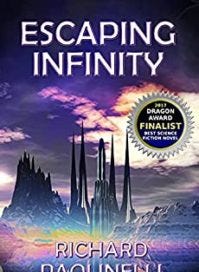Review: Escaping Infinity, by Richard Paolinelli
This book starts out like David Weber, continued as written by Rod Serling, and ends with the epic scope of John C. Wright.
If you want world-bending, rule-breaking science fiction that explores great new ideas and explores philosophical insights about humanity, the way classical SF used to be, then you better get your hands on the complete works of John C. Wright.
But make danged certain to get Richard Paolinelli in the same shopping trip, because he will do the exact same thing... usually, using fewer twenty-dollar words.
Escaping Infinity was my introduction to the man who I would easily put in the top 5 science fiction authors of today.
And for the record, no, this is NOT the author who wrote Eragon, that's Christopher Paolini.
The story
Peter Childress and his buddy Charlie Womack are engineers driving to Phoenix. But Charlie's “shortcut” has them lost in the middle of the Arizona desert. When their car breaks down in the middle of the night, they figure they're well and truly screwed. Lucky for them, Peter and Charlie trip over the Infinity Hotel. Charlie can't help but enjoy all of the hotel's casino and other delights.
Peter, on the other hand, wonders where the front door disappeared to, and why the floors on the inside of the building seem to go on forever.
If you read the above and thought this was a scifi version of The Twilight Zone taking place in the Hotel California... yeah, pretty much. Sort of. After a fashion.
Though if you're worried that the description above will spoil the plot, it only covers up to chapter 2. Our hero, Childress, has already started to piece together that the hotel is bigger on the inside by that point.
Yes, the Hotel Infinity is bigger on the inside. And if you think that's bad, you should see the Star Trek references. Heh.
The book is written in a style that's very novel-like. Less Victor Hugo, and more modern novel, but Richard is very much an artist with no pretensions. It’s smart and well-thought-out, a mystery that plays perfectly fair, and gives the reader all of the pieces and parts to figure out what the bloody blue heck is going on. However, you really won’t figure it out.
I will say that going from the prologue to chapter 1 in a little disorienting, as it goes from space opera, David Weber style, to a road trip in the South West. The last 10% of the book could have been an additional novel by itself, with what it pulled off. But the ending we got gave a complete, satisfying conclusion to the story, the characters, and the world that’s been established.
The characters
One of the nice things here is that everyone has a back story. And I do mean everybody. If they have a name, they have a backstory. There’s at least one chapter of history for almost every named character. We know their full biography. It’s so effortlessly done, it’s a joy to see how he does it.
Oh, and while we’re trying to to escape the ultimate booby trap hotel, free all the inhabitants, save the world, and figure out what’s going on here, Richard found time for a romance subplot that’s surprisingly well done and ties in to everything.
The world
I’m going to have to pass on this one. One of the key elements to this is the mystery, and I can't explore the world building without spoilers.
Suffice it to say that Richard uses very little and that it effectively describes a lot.
The politics
The politics are, in a way, socially conservative. It favors small towns over big cities, (“small” being a few thousand instead of millions) and focuses a lot on family units and personal responsibilities. That's as much as I can get into without spoilers.
Content warning
There will be a fade-to-black, offscreen sex scene. That's it. I don't even think there were any four letter words.
Who is it for?
Do you like Rod Serling? David Weber? John C. Wright? Classical Science fiction that explored new ideas without worrying what other people might think? Then read Escaping Infinity.
Why read it?
At the end of the day, this book starts out like David Weber, continued as written by Rod Serling, and ends with the epic scope of John C. Wright.
Richard Paolinelli obviously also thinks in terms of epic scope. I won't say that Paolinelli is in Wright’s league just yet. Give him another book or two, and expect Wright to have serious competition in the “awe-inspiring scale” category.




